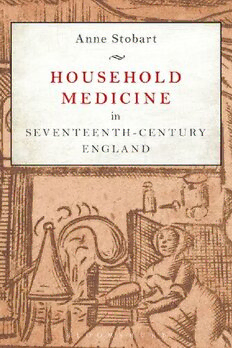
Household Medicine in Seventeenth-Century England PDF
305 Pages·2016·2.313 MB·English
Most books are stored in the elastic cloud where traffic is expensive. For this reason, we have a limit on daily download.
Preview Household Medicine in Seventeenth-Century England
Description:
How did 17th-century families in England perceive their health care needs? What household resources were available for medical self-help? To what extent did households make up remedies based on medicinal recipes?Drawing on previously unpublished household papers ranging from recipes to accounts and letters, this original account shows how health and illness were managed on a day-to-day basis in a variety of 17th-century households. It reveals the extent of self-help used by families, explores their favourite remedies and analyses differences in approaches to medical matters. Anne Stobart illuminates cultures of health care amongst women and men, showing how ‘kitchin physick’ related to the business of medicine, which became increasingly commercial and professional in the 18th century.This book focuses on household healthcare in seventeenth-century England which has been little researched, although widely assumed to have existed as part of a self-help culture. Drawing on family papers this book reveals considerable detail and the complexity of how health and illness were managed on a day-to-day basis in gentry and aristocratic households. Much information was shared, from news about health to concerns and fears and medicinal recipes which were widely collected by both women and men. Varied approaches to self-help were used by families, and this book identifies gender roles and consumption practices, including favourite recipes and medicine purchases, from simples to universal cure-alls. Resources for household healthcare included a range of medicinal supplies, from foods to countryside plants and exotic drugs from the apothecary. Treatment and care of children’s complaints and chronic conditions in later seventeenth-century households are explored, showing how both women and men drew on their understanding of disease, and experiences of self-help, to influence treatment. Continuity and change in household healthcare during the seventeenth century are evaluated alongside the availability of commercial and professional medicine. This book contributes to understanding the key role of medicines and self-help in the process of negotiating healthcare in early modern England.
See more
The list of books you might like
Most books are stored in the elastic cloud where traffic is expensive. For this reason, we have a limit on daily download.
